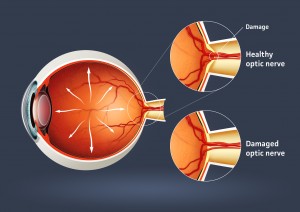 Glaucoma is one of the most common causes of preventable blindness in the world. There is no cure for glaucoma but there are proven treatments that can significantly slow its progression. The keys to managing disease are early diagnosis, proper treatment, and regular eye exams.
Glaucoma is one of the most common causes of preventable blindness in the world. There is no cure for glaucoma but there are proven treatments that can significantly slow its progression. The keys to managing disease are early diagnosis, proper treatment, and regular eye exams.
WHAT IS GLAUCOMA?
Glaucoma is an eye disease that causes damage to the optic nerve, which is the structure that sends visual information to the brain. No one knows the exact cause of glaucoma, but one of the biggest risk factors is increased intraocular pressure (IOP). When the pressure in the eye is too high, the optic nerve can be damaged. The most common result of this is reduced peripheral vision. If not managed properly it can even lead to blindness.
WHO GETS GLAUCOMA?
Glaucoma affects people of every race, gender, and nationality. Anyone can develop glaucoma, but some people are at higher risk than others. Known risk factors include:
- Increased age
- Family history of glaucoma
- Increased IOP
- African, Scandinavian, Celtic, or Russian ancestry
- Diabetes
- Nearsightedness
- Regular or long-term use of steroid medications
- Previous eye injury
WHAT ARE THE SYMPTOMS OF GLAUCOMA?
Most people do not know they have glaucoma until they lose some eyesight. However, ophthalmologists can detect and treat glaucoma before most patients experience any symptoms. Glaucoma develops slowly over time, which is qhy many patients can go for years untreated without noticing symptoms. However, patients with glaucoma may experience a gradual narrowing of the peripheral vision, also called “tunnel vision”. Unfortunately, loss of vision due to optic nerve damage cannot be reversed.
HOW IS GLAUCOMA TREATED?
Unfortunately there is no cure for glaucoma. However, glaucoma can usually be treated effectively if caught early. Currently all methods of treatment are directed at lowering IOP. The two main options initially are eye drops or laser treatment. These can also be used in combination to lower the IOP to an acceptable level. Your ophthalmologist will work with you to determine which treatment option is best for you initially. If laser and eye drops fail to control the pressure, surgery to lower the pressure may be recommended.
